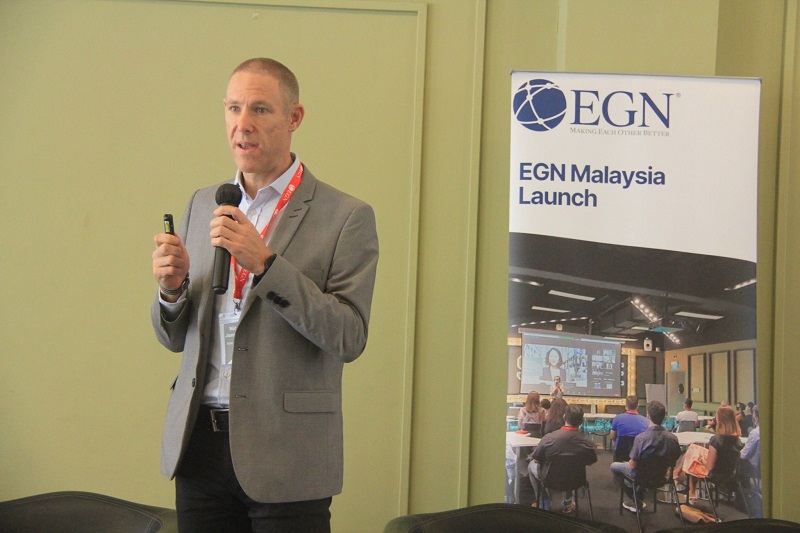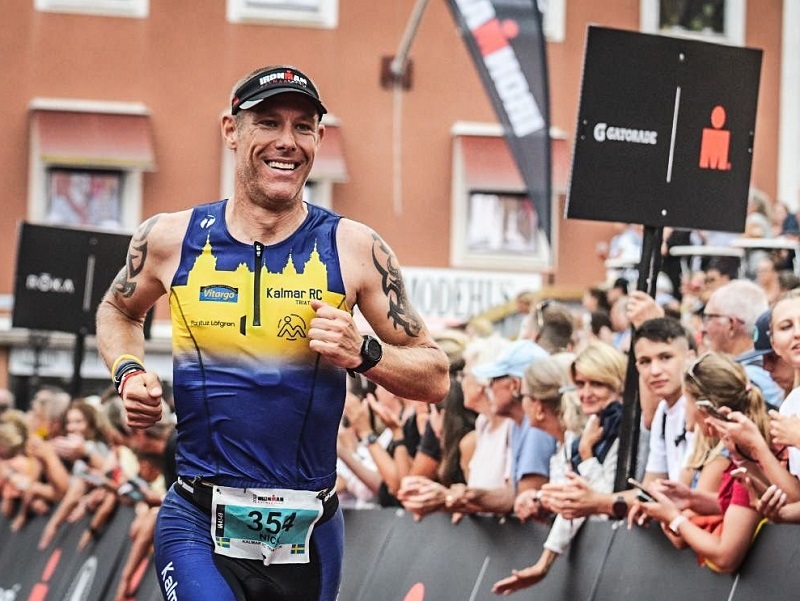
Nick Jonsson, author of Executive Loneliness (Photo: SooPhye)
Senior executives who keep their door open know that having those under their charge walk in and out encourages discussion of problems and challenges, and the exchange of ideas on possible solutions. Now, which room can they go to if they themselves need to do the same within the company?
There is no one to help them navigate the challenges of running the organisation, says Nick Jonsson, author of Executive Loneliness. As such, when executives feel stressed or anxious about work, they usually do nothing to address it, often for fear people will judge them or doubt their ability to lead.
In a vicious cycle, negative feelings pile up and take a mental and physical toll on the executive, both at work and outside it. Psychologists say executive loneliness leads to varying degrees of depression that manifest differently. In Jonsson’s case, and those of many corporate leaders he has spoken to, things start to unravel from there.
The price of having one room to yourself could amount to more than physical isolation. “Imagine you are a CEO constantly on the road. You are supposed to give energy and direction to everyone. Who’s going to give you that? It can be very lonely at the top.”
Jonsson, who has worked across Europe, Australia and Asia for more than 20 years in management, sales and marketing, is co-founder and managing director of Executives’ Global Network Singapore. EGN, set up in Denmark in 1992, is an executive peer networking platform that matches senior executives in confidential groups to help each other face challenges and identify opportunities.
“Loneliness” is a word wrapped in stigma, Jonsson says. “Executives want to show off their fame and success. Very few want to talk about the dark side of things. Besides, as a general manager, you cannot really express your concerns to your team.
“In my corporate career, I could see depression among many of them. I was frequently stressed and depressed when I left work. I worked in the medical industry, managing hospitals and clinics, surrounded by doctors. But we didn’t talk about the mental side of things. I was lonely, and found others had those feelings, too.”
book1.jpg

Ego makes things worse, especially for the anxious overachiever, he thinks. “Maybe you had to elbow your way to the top and impress the bosses. Maybe you stepped on some toes. In that sense, you worry that people will attack you or try to take your job. They are jealous of your bigger office and big car.” Senior executives often work long hours and constantly fly from one place to the next. Along the way, bad habits fall into place because there is no time to exercise or have proper meals. “Maybe they turn to addictions, like alcohol, which happened to me also.”
Jonsson shares his own experience of spiralling down the rabbit hole. “In high school, I had very bad grades and was not succeeding in anything. In university, I found a way to get to the top of the class and get a scholarship.” Achieving became an addiction: If he studied very hard, he could obtain a diploma and gain recognition. “It was my way of proving myself. I brought that with me into the business world. I wanted to go as high as I could. Many leaders are like that.”
Ambition is not necessarily bad, but the years have shown him that engaging with and lifting other people up along the way works better. “Authentic, vulnerable leaders bring up the team with them,” he says. And they are happier for doing so.
For three years starting in 2015, he was far from happy. A series of events built up to a swell that floundered him. At its vortex was loneliness, which fed panic attacks and feelings of isolation, stress, anxiety and depression.
“I had resigned from my job, divorced my wife and was not happy with anything in my life. I didn’t know which country was my home anymore. I had no friends; I could have gone anywhere for a few days and people wouldn’t know where I was.”
He was homesick, too, but returning to Sweden would mean having to live with his parents. He found escape in drink, which triggered a downward spiral. “My health suffered and I was in denial for two years. I was jumping from job to job and not finding anything. I hit rock bottom.”
Anyone looking at Jonsson then would never have guessed the turmoil bubbling behind the mask he wore. The truth kicked in when his left foot swelled up and doctors had no idea what was wrong. He was convinced he was dying because the males in his family died at the average age of 44 and he was 42.
egn.jpg

“I did not have suicidal thoughts but I thought it was all over.” Just before the problem with his leg — the swelling was later diagnosed as a psychosomatic symptom of the depressive disorder he had lived with for years — he had drawn up his will and sought treatment at a psychological ward in Thailand, away from people who might know him. Strong medication affected his coordination and caused headaches, nausea and blurred vision. It helped him stay off alcohol but did little for his emotions.
Reality struck in 2019 when a friend he was working with on a project killed himself. “Simon had never shown any sign that things were difficult for him. We all assumed he was living the dream. His Facebook page was packed with happy photos and comments.”
The shock turned Jonsson’s focus to what he terms “smiling depression” and how he himself had only talked about his own dark times to his second wife, Dona Amelia, now co-founder and managing director of EGN Indonesia.
By then, a few things happened by chance that threw him a lifeline. “I had remarried and my wife thought I was a jolly, outgoing person. Three weeks after our marriage, I told her how I felt inside and she was shocked. She grabbed me and took me to a doctor, a friend and a support group. She called my parents; they had no idea. They saw my pictures on Facebook and thought I had a good career.
“Within 24 hours of telling Dona, the whole world was supporting me and it was basically over — just because I had spoken to enough people. All I had was this fear inside me: People would find out, and then what would they think of me? Once that was removed and people knew about me, I had nothing to lose and could come back very quickly. I stopped all the bad habits — I’ve not had any alcohol for five years now — connected with God and relearnt everything.
“I got out by admitting to myself that I had a problem and by starting to speak up and asking for help and getting support. That’s why I wrote the book, starting in 2019. It has my story and those of executives whom I interviewed, as well as ‘Pathways to Overcoming Isolation, Stress, Anxiety and Depression in the Modern Business World’, its subtitle. I want to help others who find themselves in the same trap. I volunteer with the Samaritans of Singapore, too. That’s my way of making sure I stay on the path.”
EGN also keeps him grounded. He says it is a safe place where leaders can come together and talk, a place where members are not judged. “We are basically curating a network of peers based on diversity. Our job is to map out: Here are the challenges; here is the expertise. Everyone is encouraged to share and help each other.”
nick_triathlon.jpg

In October, Jonsson met with a group of CEOs and managing directors in Kuala Lumpur, for EGN’s first meeting in Malaysia. Members get to attend six facilitated meetings a year, where they can go prepared with questions and the issues they are facing. For example: I have problems recruiting and retaining young people; I have problems with the innovation mindset and working from home.
“We facilitate the sessions and members can learn from their peers about all these businesses. Many executives feel relieved to be able to speak up about issues that crop up at work,” Jonsson says. “People are very good at putting on a show. We have to create a culture of open sharing where people feel comfortable talking about how they feel. There are also support groups they can join.
“When executives hear others talk, they begin to realise, and then share that they, too, face similar problems. Just by having that sympathy as humans, they feel they’re not alone. That is something we need: to know we are not alone.”
EGN did a survey of its members in Singapore and found that 30% of leaders feel lonely in their jobs. Asked whether they talked to their boss or HR about such feelings, 84% said no. And 75% of respondents admitted they did not seek help. “During the pandemic, I went back to the same group of people, and the number of those who cited loneliness at work had doubled to 60%!”
One in seven people in Singapore experienced a mental health condition in their lifetime, a general study by its Institute of Mental Health showed four years ago.
A general study by Singapore’s Institute of Mental Health published in 2018 shows one in seven people in the country experienced a mental health condition in their lifetime.
Jonsson relates how he had interviewed a manager of an international bank in Singapore who admitted to feeling lonely sometimes. Then she asked to meet him again. “This time, she told me she had rehearsed her own suicide, twice. She had just not decided on the date yet. That was very scary to hear.”
The good news is that after their meeting, the woman connected with a therapist and got her husband involved. She is now on sabbatical from her job, working to get herself well again.
The way back for Jonsson is uplifting too. “In my case, it was through health and sleep — I ate better, slept well and started exercising again. Mentally, it was about speaking up and getting support. I needed some medication, but managed to taper that off after a few months. These days, I call exercise the happy pill. If you do that, you don’t need any medication,” says Jonsson, a regular at triathlons, besides talking about fitness and mental well-being.
This article first appeared on Dec 5, 2022 in The Edge Malaysia.


